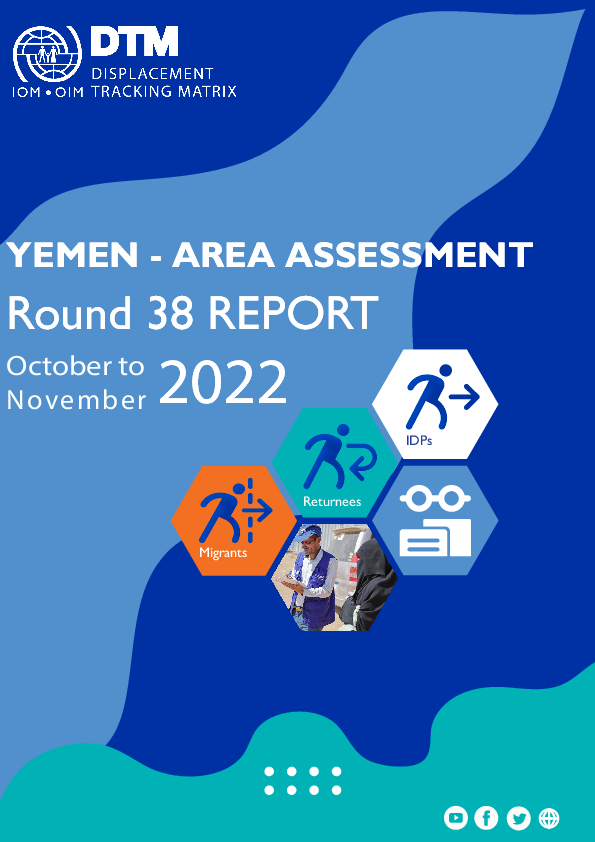-
Countries
-
Data and Analysis
-
Special Focus
-
Crisis Responses
DTM Yemen - Area Assessment Round 38 Report

Contacto
DTM Yemen, iomyemendtm@iom.int
Idioma
English
Ubicación
Yemen
Fecha de instantánea
Oct 01 2022
Nov 30 2022
Actividad
- Migrants presence
- Mobility Tracking
This summary presents the findings of the 38th round of Area Assessment (Mobility Tracking) undertaken by IOM’s Displacement Tracking Matrix to establish a new baseline on the number of Internally Displaced Persons (IDPs), IDP returnees and migrants in Yemen.
Findings are currently limited to the country’s south controlled by the internationally recognized government (IRG). Data was collected by 153 enumerators through an extensive network of Key Informants (KIs) within the operational area. In the Yemen context, the practice for field teams is to select KI representatives of both the host and target communities while adhering to the humanitarian principles of humanity, neutrality, impartiality and operational independence.
This ensures that the selected KIs are the most relevant and appropriate individuals to ensure the successful implementation of the exercise. This round 3,633 KIs were interviewed to collect the data, of whom seven per cent or 270 were female and 93 per cent or 3,363 were male. Among the main outputs of the Sub-Area Assessment, is a list of locations where IDPs, returnees and / or migrants are present that can be used to inform more detailed assessments at the location level, including the annual Multi-Cluster Location Assessment (MCLA). DTM field staff, along with KIs, use the Sub-Area Assessment tool to capture locations, which are matched to the identified locations in the OCHA Common Operational Dataset (P-Codes).
Using a standardized and structured approach to the selection of KIs is a key step to ensuring that data collected in the Sub-Area Assessment is comprehensive and comparable across the different teams. The Sub-Area Assessment tool is used to verify and update the baseline information in regular intervals (rounds). Deployed DTM staff, called enumerators, are in regular communication with their KI network throughout each month and work continuously to maintain and expand this network to further triangulate the displacement statistics collected. The forms and definitions used can be accessed here. Please note that findings represent the results of a pilot round in this new format. The number of migrants indicated in this report represents a snapshot in time for a transient population located in areas data collection teams could access. Findings for Aden Governorate are not supported by Yemen’s Central Statistical Organization (CSO) and the Executive Unit for IDP Camps Management (ExU) for this round but will be further verified in the subsequent round of the Area Assessment in 2023. The ExU maintains that the current number of IDPs living in Aden stands at 145,857 individuals.
In a total of 394 sub-districts, IOM recorded a presence of IDPs in 364 sub-districts (92%), a presence of IDP returnees in 182 sub-districts (46%) and a presence of migrants in 74 sub-districts (19%).
